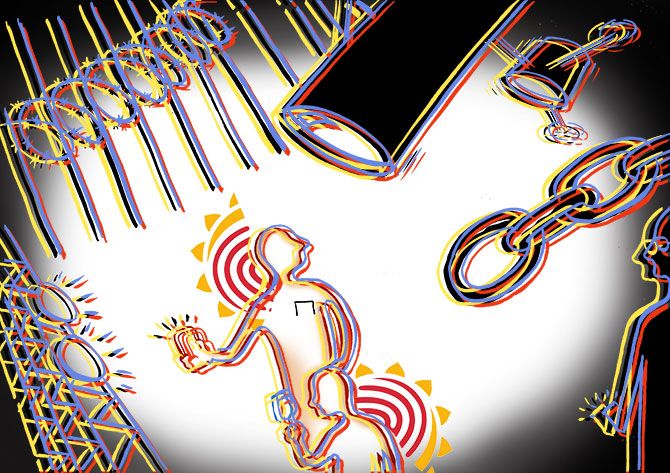UID/Aadhaar-based surveillance does not end with the collection of fingerprints and iris scan, it goes quite beyond it and poses a lethal threat to the idea of India, says Gopal Krishna.
Illustration: Dominic Xavier/Rediff.com

While responding to a request for an urgent hearing in the matter of 'biometric information' based e-identity and 12-digit biometric unique identification (UID)/Aadhaar number-related projects, when the Chief Justice Jagdish Singh Khehar-headed three judge bench asked, 'Surveillance to what. Is it a big deal?' the beneficial owners of the World Bank Group in general and the International Monetary Fund in particular must have patted their backs in satisfaction.
The arrival of a presumptuous Surveillance State is linked to the emergence of a Database State. In Discipline and Punish: The Birth of Prison, Michel Foucault observed that surveillance is based on a system of permanent registration. It is a decisive economic operator.
A chapter titled 'On the Map: Making Surveillance Work' under the section 'Revolutions in the International Monetary System' in the book, Silent Revolution: The International Monetary Fund 1979-1989 corroborates Foucault's contention. This book was published by the IMF in 2001.
The chapter deals with the principles and procedures of surveillance.
It admits that 'Surveillance, a central pillar of IMF activities and responsibilities in the modern era, is not an easy concept to grasp.'
It will have us accept that only the heads of public institutions can grasp and communicate the meaning of 'surveillance.'
The IMF commiserates with lesser mortals, stating that it knows that 'surveillance' does sound terrible. This is understandable.
But it does not sound terrible to the three judge bench.
Jacob A Frenkel, an IMF official, is quoted in the book as arguing that this word 'surveillance' should be made to sound benign.
It 'should give way to concepts of cooperation, partnership, and consultation; of bringing on board the rest of the world’s considerations.'
This publication states, 'In practice, surveillance has encapsulated all of the above notions, but at its best it has been motivated by and has itself promoted a spirit of international cooperation.'
This publication informs that the first official use of the term came in June 1974. The IMF was concerned that 'Few, if any countries, however, were prepared to be subjected to surveillance in that strong sense. The 1980s therefore became a decade of experimentation, in which the staff and management of the Fund constantly probed and prodded to see how far they could go in persuading countries to respond positively to Fund analysis and advice.'
This concern of the IMF is deeply touching. But the IMF's efforts did yield results and by the mid-1990s, a 'silent revolution' had happened in countries like India, it infers.
By 2013, citizens of at least 35 countries and their heads came to know exactly what 'surveillance' means due to disclosures by Wikileaks, Edward Snowden, Chelsea Manning, Glenn Greenwald and Laura Poitras. It sounded terrible to them.
Both the US National Security Agency and the World Bank Group have a different and benevolent sounding meaning in mind.
'Even among IMF staff,' the publication admits, 'those questions did not yield uniform answers.'
This incomprehension among them is understandable because it admittedly means 'close observation especially of a suspected person.'
Heads of financial institutions, the US president and the Indian prime minister appear to be busy getting this dictionary meaning of 'surveillance' changed through their powers of persuasion, peer pressure and advertising to avoid confusion that still exists despite relentless and sincere efforts at least since 1974.
Public institutions seem to have been taken for a ride.
'If surveillance was to have any substance,' the IMF publication states, 'the Fund would have to develop that influence: Through the power of persuasion (Fund management and staff to country authorities), through peer pressure (country to country in the forum of the Fund), and through publicity (Fund to the public).'
'The relative merit of each of these channels was always the subject of much debate. Was publicity appropriate, or would it conflict with and even nullify the benefits of persuasion and peer pressure?'
The publication uses the word 'Fund' to refer to the IMF.
'Did surveillance mean that the IMF was expected to be a financial Interpol, seeking out and punishing errant behaviour, or should its role be more that of a faithful confidant of those entrusted with implementing macroeconomic policies around the world?' the IMF asks itself.
Have most public institutions in India become a 'faithful confidant' of the World Bank Group?
There is a revelation in the publication that the IMF is concerned with the 'viability of military spending' as well.
The IMF took a formal position on the role of military spending in national economic policy in October 1991.
At that time, its executive directors concluded that, 'As military expenditure can have an important bearing on a member's fiscal policy and external position, information about such expenditure may be necessary to permit a full and internally consistent assessment of the member's economic position and policies.'
If this is not an exercise in surveillance, which admittedly sounds 'terrible', what else is it?
Earlier, on April 23, 2010, the World Bank launched its eTransform Initiative by signing a memorandum of understanding with France and South Korea besides transnational companies like L-1 Identity Solutions, IBM, Gemalto, Pfizer and others.
The World Bank is currently funding 14 projects related to e-government and e-ID around the world.
The Supreme Court judges may have missed watching Gattaca, a 1997 film written and directed by Andrew Niccol which dwells on a genetic registry database that uses biometrics to classify 'valids' and 'in-valids.'
If the 12-digit biometric UID/Aadhaar number-based surveillance is not abandoned the way it has been abandoned in China, Australia, the Philippines, the US, the UK and other countries, the court will soon be dealing with 'valid' and 'invalid' Indians.
The emergence of such architecture poses a lethal threat to the very idea of India.
Referring to the incident of surveillance of his mobile phones, in an article titled My Call Detail Records and A Citizen's Right to Privacy (external link) published in Gujarati, Hindi, Urdu and English, Arun Jaitley, then the Leader of the Opposition in the Rajya Sabha, wrote, 'This incident throws up another legitimate fear. We are now entering the era of the Adhaar number. The government has recently made the existence of the Adhaar number as a condition precedent for undertaking several activities; from registering marriages to execution of property documents. Will those who encroach upon the affairs of others be able to get access to bank accounts and other important details by breaking into the system? If this ever becomes possible the consequences would be far messier.'
It is clear that once lawmakers become part of the government, they become enlightened about the benefits of surveillance.
It is relevant to reiterate in this context that Nandan Nilekani, the then chairman of the Unique Identification Authority of India, was given the ID Limelight Award at the ID World International Congress 2010 in Milan, Italy, wherein Safran Morpho (of the Safran group) was a key sponsor of the ID Congress.
Its subsidiary, Sagem Morpho Security Pvt Ltd, had been awarded a contract for the purchase of biometric authentication devices on February 2, 2011, by UIDAI.
Coincidentally, in 2009, a similar award was given to the head of Pakistan's National Database Registration Authority which successfully implemented a UID/Aadhaar-like project, which has been shared with authorities in the US as per cables (external link) leaked by Wikileaks.
Is it a coincidence that Morpho sponsored the award to the chairman, UIDAI, and the former got a contract from the latter?
It may also be noted that UIDAI awarded contracts to three companies -- Satyam Computer Services Ltd (Mahindra Satyam), as part of a 'Morpho-led consortium', L-1 Identity Solutions Operating Company and Accenture Services Pvt Ltd of US for the 'implementation of biometric solution for UIDAI' on July 30, 2010.
Following the Central Information Commission's intervention in the matter of application filed by Colonel Mathew Thomas, an octogenarian defence scientist, and submissions by the author on his behalf, UIDAI shared its contract agreement with French and US biometric technology companies, but crucial pages are missing from the contract agreement after the CIC heard the matter on September 10, 2013.
When this was pointed out to the new information commissioner, he ordered the registrar, CIC, to check compliance by UIDAI's earlier order.
The registrar then informed that the new information commissioner has allowed UIDAI to furnish limited financial information.
In effect, he changed the earlier order of the CIC without the authority to do so.
The writ petition (civil) No 9143/2014 in this regard is pending in the Delhi high court. The next date of hearing has been fixed for February 21, 2017.
In the meanwhile, J Satyanarayana's appointment as part-time UIDAI chairman on September 6, 2016, does not inspire even an iota of confidence.
On pages 46-47, the report by the Parliamentary Standing Committee on Information Technology that examined the work of the department of electronics and information technology (DeitY), ministry of communications and information technology, asked about the surveillance by the US National Security Agency. J
Satyanarayana, as secretary, DeitY, formally communicated that India has no problem if they conduct surveillance for metadata, in fact it is acceptable and tolerable but 'incursion into the content will not be tolerated and is not tolerable.'
Notably, the ministry of electronics and information technology, which was formed by giving the status of a ministry to DeitY, has been misleading state governments, the media and citizens.
The idea of UID was incubated in this very department.
The old maxim, If you have nothing to hide, you have nothing to fear, has been given a very public burial. This has been thoroughly debunked.
Notably, this myth is attributed to Nazi propaganda minister Joseph Goebbels. Database State, a report from the UK, states: 'In October 2007, Her Majesty's Revenue and Customs (Department) lost two discs containing a copy of the entire child benefit database.'
Only blind faith in a Utopian State can persuade people to think that they have nothing to fear after trusting their personal sensitive information to a Database State.
If an UID/Aadhaar-enabled Biometric Attendance System is indeed a 'digital equivalent' of an 'age-old attendance register,' why did the National Human Rights Commission object to a radio collar which can also be argued by sophists to be a 'digital equivalent'?
Notably, the Union ministry of external affairs agreed with the NHRC's assessment.
The Union minister of external affairs informed Parliament that some 18 students were detained and released in the US with radio monitoring devices on their ankles, pending completion of investigations for possible involvement in irregularities.
'We have also strongly protested the radio collars as unacceptable, which should be removed immediately.'
If the 'digital equivalent' means biometric equivalent as well, then radio collar and DNA-based identity and attendance will also be deemed equivalent to 'age-old attendance register.'
It is quite evident that such claims are deeply misleading.
Giorgio Agamben, the 74-year-old Italian philosopher who has been teaching at the University of Venice and New York University, predicted in 2004 that the 'bio-political tattooing' is the precursor to what would later turn into a normal identity registration of a good citizen.
It provides a continuity between the world of the Nazi concentration camp and contemporary democracy.
It paves the way for a genocidal liberal order.
Biometrics 'concerns the enrollment and filing away of the most private and incommunicable aspect of subjectivity,' which consequents into the capture of the human body by the authorities for good.
Till now such assault on the private human body was an exception, now it is becoming the norm.
Surveillance has been used as a tool to shape the relationship between the citizen and the State.
Both identification and surveillance have co-existed since time immemorial, but it is now assuming frightening architecture with the marriage of statistics of biological characteristics, and biometric technology with digital sculpture.
The reference to 'such other biological attributes' in Section 2 (g) of Aadhaar (Targeted Delivery of Financial and Other Subsidies, Benefits and Services) Act, 2016, and the definition of 'biometrics' under the Information Technology (Reasonable security practices and procedures and sensitive personal data or information) Rules, 2011 under section 87 read with section 43A of Information Technology Act, 2000 underlines that it includes 'the technologies that measure and analyse human body characteristics, such as "fingerprints", "eye retinas and irises", "voice patterns", "facial patterns", "hand measurements" and "DNA" for authentication purposes.'
It is abundantly clear that the plan of UID/Aadhaar-based surveillance does not end with the collection of fingerprints and iris scan, it goes quite beyond it.
According to the Concise Oxford Dictionary, surveillance means 'close observation, especially of a suspected person'.
So far the Supreme Court has not had the occasion to examine the most glaring aspect of cyber biometric surveillance, which entails close observation of all the present and future Indians indiscriminately as suspects.
Notably, colonial powers had suspect identification offices in Egypt and India after the development of biometric identification by Sir Francis Galton, an English eugenicist who supported slavery.
In the book Imprint of Raj: How Fingerprinting was born in Colonial India, Chandak Sengoopta (2003) reveals how biometric identification technique was fine-tuned by the Bengal police.
Eugenics and slavery have long been abandoned, the scientific claims of biometrics too have been found to be dubious (external link) by reputed institutions.
If surveillance is not a big deal, why is Edward Snowden in Moscow since June 23, 2013?
Why is Australian journalist Julian Assange in Ecuadorian embassy in London since July 19, 2012?
And why was Chelsea Elizabeth Manning (formerly Bradley Edward Manning) sentenced to 35 years imprisonment in August 2013?
If surveillance is indeed such an innocent act, then why is the entire US establishment paranoid about surveillance from Russia?
Isn't the word 'surveillance' being made to sound benign as desired by the IMF?
Gopal Krishna is member, Citizens Forum for Civil Liberties, and appeared before the Parliamentary Standing Committee on Finance that examined and trashed the UID/Aadhaar Bill, 2010.
He is editor, www.toxicswatch.org






